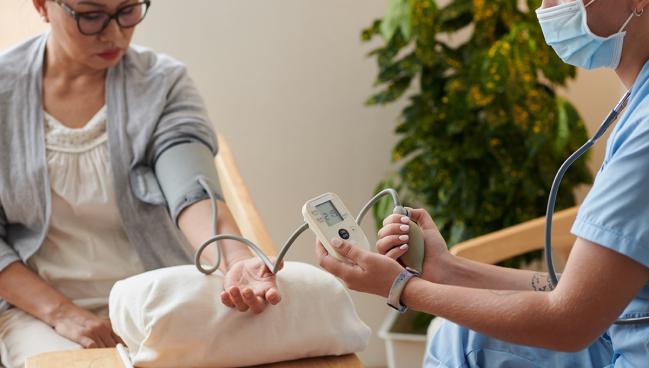Reduction in BP Drives Treatment Preference for Hypertensive Patients
If renal denervation can beat pills for BP-lowering, even by a little bit, patients would go the interventional route, survey data hint.

When it comes to choosing treatments for uncontrolled hypertension, the most important consideration for patients is the extent of blood pressure reduction, with side effects or risks from pharmaceutical or device-based therapies having much less influence on their decisions, according to a new survey.
Overall, patients would prefer medical therapy to interventional treatments such as renal denervation, but this preference no longer holds if the interventional treatment yielded larger reductions in blood pressure.
“In general, people would prefer not to undergo a minimally invasive procedure such as renal denervation if they didn’t have to for blood pressure-lowering,” lead investigator David Kandzari, MD (Piedmont Heart Institute, Atlanta, GA), told TCTMD. However, “if they could achieve even modest reductions in blood pressure—in the order of 2 to 3 mm Hg—they would favor renal denervation over no therapy at all or over escalating their medicines.”
In prior surveys of patients with hypertension, approximately one-third preferred renal denervation to taking more medications for blood pressure control. Those surveys, while insightful, have limitations, said Kandzari, adding that the present “discrete-choice experiment” is a more-rigorous way to characterize how individuals make decisions because it can quantify the relative importance of features that drive decision-making. The US Food and Drug Administration has said that discrete-choice experiments can be used to aid regulatory decision-making, he added.
Kirk Knowlton, MD (Intermountain Healthcare, Salt Lake City, UT), who wasn’t involved in the study, said that discussions around treatment can be challenging, noting there can be a push/pull when it comes to patient preference and what the physician thinks might be the best treatment option long term.
We found that, by far, a reduction in blood pressure, any reduction in blood pressure with a drug or a device, was the biggest driver of an individual’s preference. David Kandzari
“I was really pleased to see that the major driver for therapy was control of blood pressure,” Knowlton told TCTMD, adding that patient priorities appear to be in the right place. “We’ve proven over and over again that the closer blood pressure gets to 120 mm Hg, the better it is at improving clinical outcomes for that patient.”
Knowlton said that in his experience patients will usually follow a physician’s recommendation for hypertensive treatment, adding that he believes most would be willing to undergo an interventional procedure if it “provided a significant effect on their blood pressure.” He found the present study a little surprising, though, noting that just an additional 2.3-mm Hg reduction in blood pressure was enough to sway people’s preferences.
“I think it does demonstrate that people are willing to undergo a vascular procedure if it really will work,” said Knowlton. Personally, he’d prefer to see a 5- to 10-mm Hg additional reduction in blood pressure to offset some of potential risks of the minimally invasive procedure, which is not yet approved in the United States. He added, though, that reducing medication burden, which renal denervation has been shown to do, and is also an important factor for many patients.
BP Reduction First, Durability Second
The new study, which was published last week in Circulation: Cardiovascular Quality and Outcomes, attempted to quantify the risk-benefit preferences for patients with uncontrolled hypertension, a patient population similar to those treated in the randomized, sham-controlled trials. In total, 400 patients (mean age 59 years; 52% women) with a mean systolic blood pressure of 155 mm Hg completed the discrete-choice experiment between 2020 and 2021.
Participants chose between two hypothetical treatments—an intervention or drug therapy—for hypertension. In addition to the type of treatment, the survey captured patient preferences when factoring in the number of daily hypertension pills, reduction in blood pressure, duration of effect, risk of drug-related side effects, access-site pain and/or bruising, and risk of vascular injury. The survey also included questions to assess participants’ engagement, comprehension, and responses as a check on data quality.
To TCTMD, Kandzari said patients surveyed were not part of any prior trial testing renal denervation and were not being recruited for future studies. Instead, they were representative of those seen in real-world clinical practice where some 60% of the US population has blood pressure that exceeds the guideline-recommended targets.
“We found that, by far, a reduction in blood pressure, any reduction in blood pressure with a drug or a device, was the biggest driver of an individual’s preference,” said Kandzari. Larger reductions in blood pressure were more preferential to smaller reductions, he added.
The reduction in office systolic blood pressure had a greater influence on treatment choice than treatment durability, number of daily pills, drug-related side effects, or treatment risks. Interestingly, patients surveyed were willing to tolerate a high level of risk—more than 20%—to achieve a reduction in blood pressure, to have a durable treatment effect, or to reduce their pill burden. When it came to choosing the interventional approach to a pill-based treatment, patients were also willing to accept risks of vascular injury that exceeded 20%. In the clinical trials, the risk of complications with renal denervation are less than 1%, noted Kandzari.
The second most-important consideration for patients was the durability of treatment. Kandzari noted there are accumulating data from registries, as well as 3-year data from the SYMPLICITY HTN-3 trial and SPYRAL HTN-ON MED, showing sustained reductions in systolic blood pressure with renal denervation. Depending on the acceptable risks and degree of blood pressure-lowering, anywhere from 20% to 75% of patients with uncontrolled hypertension would be willing to accept renal denervation as a treatment, he said.
Getting to Treatment Goals
Kandzari said the study provides an important message, one directed from patients to healthcare providers. Specifically, “it’s telling us that patients are seeking alternative therapies for the treatment of their hypertension, that they’re interested in improving their health status with regard to hypertension, and that they’re also seeking alternatives to pharmacological approaches.”
I think it does demonstrate that people are willing to undergo a vascular procedure if it really will work. Kirk Knowlton
Moreover, that interest extends across the board, from patients with severe hypertension to those with mildly elevated blood pressure, as well as those taking one or no medications to those taking four or five antihypertensive drugs. Today, however, most physicians surveyed are likely to think of renal denervation, or to refer for the procedure, only if patients are on four or five medicines or have blood pressure greater than 180 mm Hg, said Kandzari.
For his part, Knowlton said the survey provides excellent information about patient preferences, but he added there are still some unknowns with respect to renal denervation, including the expected reduction in blood pressure and long-term durability, that need to be explored before the procedure gains more widespread acceptance.
“My sense is that there is evolving information about the likelihood of success with the procedure,” he said, noting that SYMPLICTY HTN-3 missed its primary endpoint at 12 months. The later durability seen at 36 months, though, is encouraging. “Perhaps it may get better over time,” he said. “It would be great if that was consistently the case.”
Renal denervation has been approved in Europe since 2013 and is recommended as a third major option for the treatment of hypertension alongside lifestyle modification and drug therapy, according to a European Society of Hypertension position statement. Medtronic, maker of the Spyral Symplicity renal denervation system (and funder of the current study), has submitted an application for approval to the FDA on the basis of SPYRAL HTN-ON MED. The Paradise ultrasound-based renal denervation system (ReCor Medical) is available in Europe.
Michael O’Riordan is the Managing Editor for TCTMD. He completed his undergraduate degrees at Queen’s University in Kingston, ON, and…
Read Full BioSources
Kandzari DE, Weber MA, Poulos C, et al. Patient preferences for pharmaceutical and device-based treatments for uncontrolled hypertension: discrete choice experiment. Circ Cardiovasc Qual Outcomes. 2023;16:e008997.
Disclosures
- The study was funded by Medtronic.
- Kandzari reports institutional research/grant support from Biotronik, Boston Scientific, Cardiovascular Systems, Inc., OrbusNeich, Teleflex, Medtronic, and Ablative Solutions. He reports consulting honoraria from Ablative Solutions, Cardiovascular Systems, Inc., Magenta Medical, Medtronic, and Terumo.





Comments